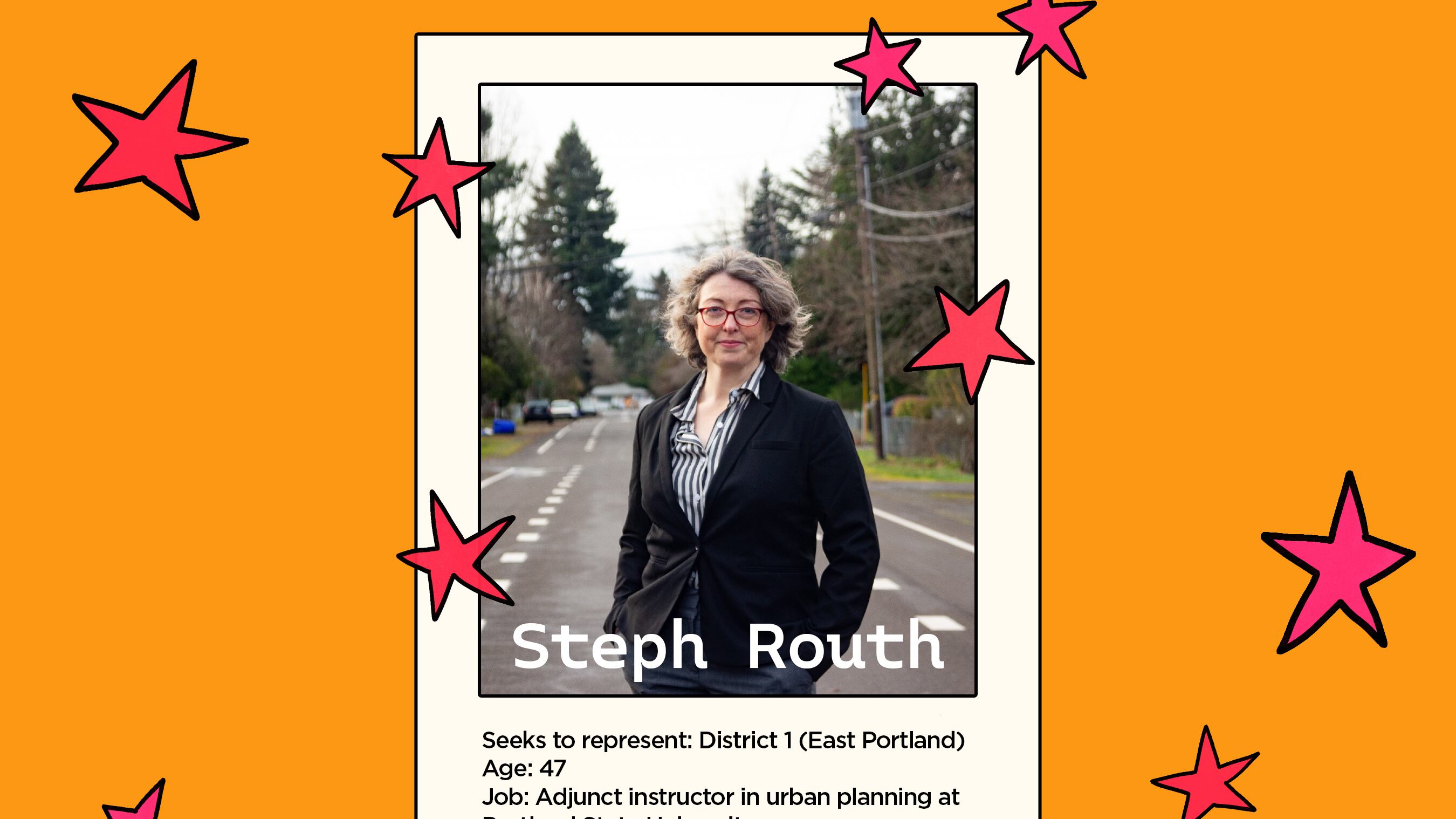- Name: Steph Routh
- Seeks to represent: District 1 (East Portland)
- Age: 47
- Job: Adjunct instructor in urban planning at Portland State University
- Fun fact: Routh was the only girl on her elementary school’s wrestling team.
Steph Routh was born and raised right in the district she wants to represent on the Portland City Council. She went to Parkrose High School in East Portland, then studied classical music performance and theater at Linfield University.
After a sojourn overseas—which included cleaning up debris in Thailand’s waters after the 2004 tsunami—she worked for several different nonprofit organizations that focused on sustainability, like Green Empowerment, and acted as the executive director of Oregon Walks, which advocates for sidewalks and crosswalks. She even married her bike in 2006 at the Multnomah County Bike Fair.
She currently serves on the Portland Planning Commission, which deals with land use planning around the city. (She didn’t serve on the charter commission but advocated for charter reform.)
Routh decided to run for office because, she says, the new charter gives East Portland, long ignored, a structural voice on the City Council. “It’s realizing the fact that East Portland will now have more representation in City Hall than ever,” she says. It’s the first time she’s run for public office.
This week, she spoke with WW about her candidacy, which already has enough donors to qualify for public financing. Questions and answers have been lightly edited for brevity and clarity.
WW: What are your top three priorities if elected?
Steph Routh: Housing and homelessness. I think being a planning commissioner sets me up pretty well for that. Community safety, which means different things to different communities at different times of the day. And better, more responsive government. It’s not the most important thing, but it’s the most urgent thing.
What’s your plan to address homelessness?
I hear a lot of people talking about the number of beds. Our unhoused population is also our most diverse population in terms of age, race, ability, everything except class. And so we need a diversity of shelter options.
What aspects of the city’s current approach to drug use and overdose deaths do you support and what would you change?
The city’s stated role is relatively limited. We need to have a robust and trusting relationship with the county. I’ll say something that my grammy always used to say, which is: “I don’t care who started the fight, I care who’s going to finish it.” I don’t care why there are issues with coordination, but I think we can all agree that there are issues with coordination. I have a pretty solid track record in building trusting coalitions.
Would you change the Portland Clean Energy Fund and if so, how?
I would say, let’s keep it. The will of the voters was pretty clear. We have a need for climate action, and the priorities intersect with building a middle-wage workforce.
Which current City Council member do you most align with?
Carmen Rubio, primarily because she holds the Bureau of Planning and Sustainability, and I served on the planning commission, so it’s pretty straightforward.
Is the city doing enough to bring back downtown and economic development? If not, what should leaders be doing that they’re not?
Downtown requires focus right now, to rebuild people’s habits in engaging with a vibrant core city. Medium term, we should look at repurposing office space to accommodate housing. We should explore downtown investments, through tax-increment financing, for example.
And short term, I believe there is so much opportunity to partner with community groups to activate downtown. My mom and I went to Tuba Christmas in December, and it was popping. Business for a Better Portland has regular Friday coffee events to support local downtown businesses. The Portland Criterium is coming up. Portlanders are creative and rise to challenges. Let’s lift up what’s working and stop giving the mic to people who don’t believe in Portland.
How do you plan to win this election?
I want to meet people where they’re at. I want to talk to people on their porches. Winning would look like, in four years, this city is functioning in a way that isn’t a big deal. It’s just boring. I’d love boring government.
See the other Portland City Council Candidates here!
 This article is part of Willamette Week’s Ballot Buddy, our special 2024 election coverage. Read more Ballot Buddy here.
This article is part of Willamette Week’s Ballot Buddy, our special 2024 election coverage. Read more Ballot Buddy here.

